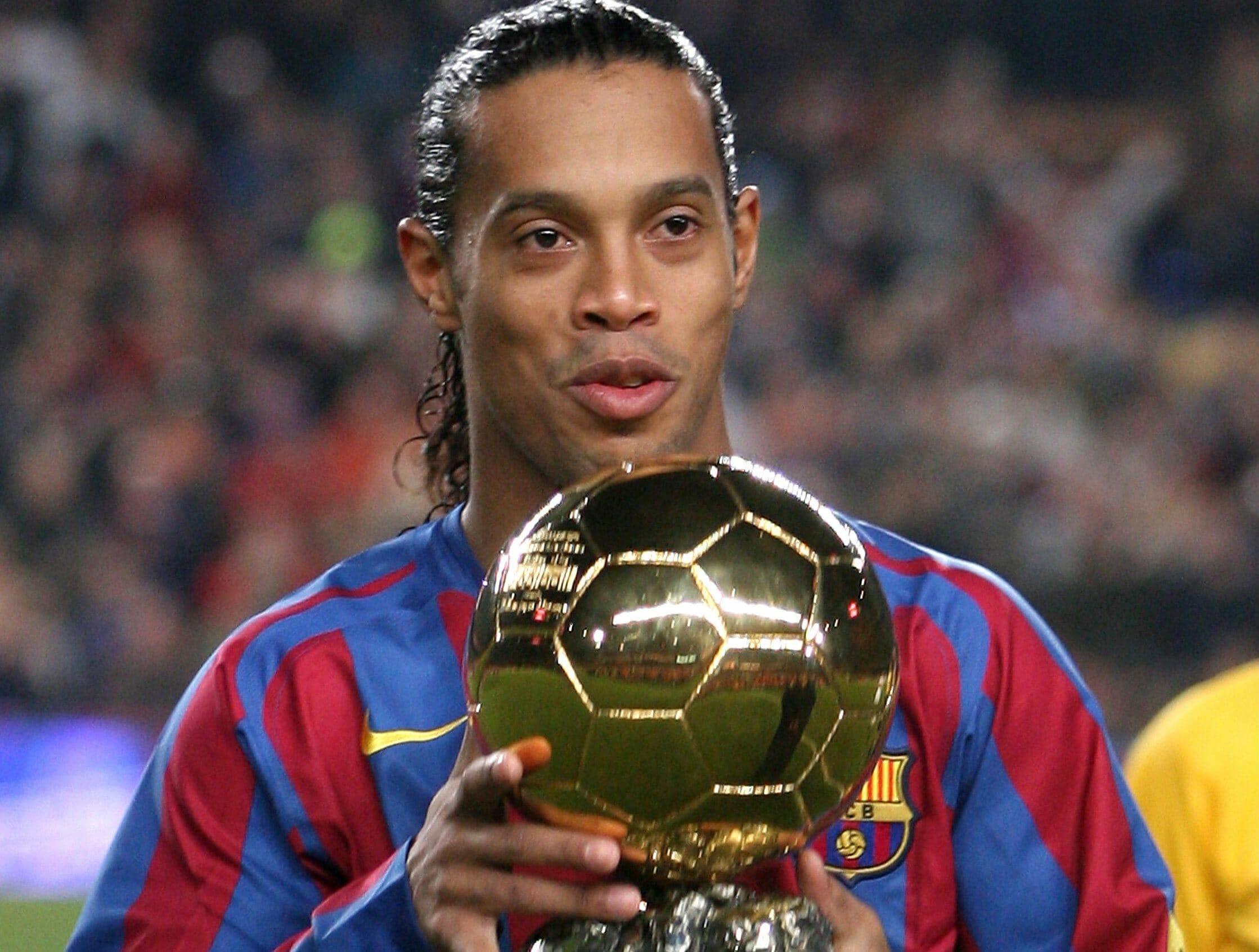Ronaldinho full name—Ronaldo de Assis Moreira—is a name that resonates with football fans around the world. Known for his dazzling footwork, infectious smile, and unmatched creativity on the field, Ronaldinho became one of the most celebrated footballers of all time. But how much do we really know about the man behind the magic? His full name holds a key to understanding his Brazilian roots and the journey that shaped him into the global icon we admire today. Whether you’re a die-hard football fan or just curious about the story behind the legend, this article will take you on a deep dive into the life and legacy of Ronaldinho.
Ronaldo de Assis Moreira was born on March 21, 1980, in Porto Alegre, Brazil. From a young age, he showed an extraordinary talent for football, earning the nickname "Ronaldinho," which means "little Ronaldo," to distinguish him from the legendary Ronaldo Nazário. His journey from the streets of Brazil to the world stage is nothing short of inspirational. This article will explore not only his biography and personal details but also his achievements, playing style, and the impact he has had on the sport. By the end, you’ll have a comprehensive understanding of why Ronaldinho full name is synonymous with brilliance in football.
As we delve deeper into the life of Ronaldinho, we’ll uncover fascinating details about his upbringing, his rise to fame, and the challenges he faced along the way. Whether you’re curious about his early life, his career milestones, or the secrets behind his mesmerizing playing style, this article has got you covered. We’ll also address some burning questions like, "What is Ronaldinho full name, and why is it significant?" and "How did Ronaldinho’s upbringing shape his career?" Let’s embark on this journey to celebrate one of football’s greatest talents.
Read also:Martin Sheens Net Worth A Testament To A Lifetime Of Achievement
Table of Contents
- Biography of Ronaldo de Assis Moreira
- Personal Details and Bio Data
- What Shaped Ronaldinho’s Early Life and Football Journey?
- Ronaldinho Full Name and His Career Milestones
- What Made Ronaldinho’s Playing Style Unique?
- How Did Ronaldinho Leave a Lasting Legacy in Football?
- What Challenges Did Ronaldinho Overcome in His Career?
- Frequently Asked Questions About Ronaldinho
Biography of Ronaldo de Assis Moreira
Ronaldo de Assis Moreira, better known as Ronaldinho, was born in Porto Alegre, Brazil, into a family that cherished football. His father, João de Assis Moreira, was a shipyard worker and an amateur footballer who played a significant role in nurturing young Ronaldinho’s passion for the sport. Tragically, João passed away when Ronaldinho was just eight years old, leaving a profound impact on the young boy. Despite this loss, Ronaldinho’s mother, Miguelina Eloi Assis dos Santos, encouraged him to pursue his dreams and provided unwavering support throughout his journey.
Ronaldinho’s football journey began in the streets of Porto Alegre, where he honed his skills playing futsal—a variant of football played on a smaller field. His natural talent and creativity quickly caught the attention of scouts, leading to his enrollment in the youth academy of Grêmio, one of Brazil’s most prestigious clubs. By the age of 17, he had already made his professional debut and was on his way to becoming a household name.
Over the years, Ronaldinho’s career took him to some of the biggest clubs in the world, including Paris Saint-Germain, FC Barcelona, and AC Milan. He won numerous accolades, including two FIFA World Player of the Year awards and a Ballon d’Or. His contributions to football were not limited to his club career; he also played a pivotal role in Brazil’s 2002 FIFA World Cup victory, solidifying his status as a global icon.
Personal Details and Bio Data
| Full Name | Ronaldo de Assis Moreira |
|---|---|
| Date of Birth | March 21, 1980 |
| Place of Birth | Porto Alegre, Brazil |
| Nationality | Brazilian |
| Height | 1.81 meters (5 feet 11 inches) |
| Position | Attacking Midfielder / Forward |
| Nickname | Ronaldinho, The Magician |
What Shaped Ronaldinho’s Early Life and Football Journey?
Ronaldinho’s early life was marked by both joy and hardship, which played a crucial role in shaping his football journey. Growing up in a modest household in Porto Alegre, he was surrounded by a family that loved football. His father, João, was not only his role model but also his first coach, teaching him the fundamentals of the game. The family would often gather to watch football matches, and young Ronaldinho would mimic the moves of his favorite players.
However, tragedy struck when João passed away from a heart attack during a football match. This event could have derailed Ronaldinho’s dreams, but instead, it fueled his determination to succeed. His mother, Miguelina, took on multiple jobs to support the family and ensure that Ronaldinho could continue playing football. Her resilience and encouragement became the backbone of his early career.
Ronaldinho’s talent was undeniable, and he quickly rose through the ranks of local football. His skills in futsal, a fast-paced version of football played on a smaller court, helped him develop exceptional ball control and quick reflexes. These attributes would later become hallmarks of his playing style. By the time he joined Grêmio’s youth academy, he was already being hailed as a prodigy, and his journey to stardom had begun.
Read also:Mike Lookinland The Iconic Child Star Who Left A Lasting Legacy
Key Influences in Ronaldinho’s Early Life
- Family Support: His mother’s unwavering encouragement and his father’s early guidance.
- Futsal Experience: Playing futsal helped him develop agility and precision.
- Local Competitions: Participating in neighborhood matches allowed him to showcase his talent.
Ronaldinho Full Name and His Career Milestones
The career of Ronaldo de Assis Moreira, or Ronaldinho, is a story of meteoric rise and unparalleled success. His journey began at Grêmio, where he made his professional debut in 1998. It was here that he first showcased his unique blend of skill, flair, and creativity, earning him a reputation as one of Brazil’s most promising talents. His performances caught the attention of European clubs, and in 2001, he made the move to Paris Saint-Germain (PSG).
At PSG, Ronaldinho’s star continued to rise. Although his time in Paris was marked by inconsistent team performances, his individual brilliance was undeniable. He scored memorable goals and dazzled fans with his audacious tricks and flicks. His performances earned him a spot in the Brazil national team, where he played a pivotal role in their 2002 FIFA World Cup victory. Ronaldinho’s iconic free-kick against England in the quarterfinals is still regarded as one of the greatest goals in World Cup history.
In 2003, Ronaldinho made a groundbreaking move to FC Barcelona, where he reached the pinnacle of his career. Under the management of Frank Rijkaard, he transformed Barcelona into a football powerhouse. His partnership with players like Samuel Eto’o and Deco led to two consecutive La Liga titles and a UEFA Champions League triumph in 2006. During this period, Ronaldinho won the FIFA World Player of the Year award twice (2004 and 2005) and the Ballon d’Or in 2005.
Major Achievements in Ronaldinho’s Career
- 2002 FIFA World Cup: Helped Brazil win the tournament with standout performances.
- 2004 and 2005 FIFA World Player of the Year: Recognized as the best player in the world.
- 2005 Ballon d’Or: Awarded for his exceptional contributions to football.
- La Liga Titles: Won back-to-back championships with Barcelona in 2005 and 2006.
What Made Ronaldinho’s Playing Style Unique?
Ronaldinho’s playing style was a masterclass in creativity, flair, and unpredictability. Unlike many of his contemporaries, he approached the game with a sense of joy and spontaneity that was infectious. His ability to perform audacious tricks, such as the "Elastico" and "Flip Flap," left defenders baffled and fans in awe. But what truly set him apart was his vision and ability to read the game, allowing him to create opportunities out of seemingly impossible situations.
One of Ronaldinho’s standout attributes was his close ball control. Whether dribbling past multiple defenders or executing a perfectly weighted pass, he made the game look effortless. His low center of gravity and quick footwork made him nearly impossible to dispossess. Additionally, his versatility allowed him to play in multiple positions, from attacking midfielder to forward, making him a valuable asset to any team.
Another aspect of Ronaldinho’s game was his knack for scoring spectacular goals. From long-range free-kicks to delicate chip shots, he had a wide array of finishing techniques at his disposal. His goal against England in the 2002 World Cup, where he lobbed the ball over goalkeeper David Seaman from 40 yards out, remains one of the most iconic moments in football history.
Signature Moves and Techniques of Ronaldinho
- Elastico: A dribbling move that tricks defenders into committing to the wrong direction.
- Flip Flap: A skillful flick of the ball that changes its trajectory mid-dribble.
- No-Look Pass: A creative pass executed without looking at the intended recipient.
- Long-Range Free-Kicks: His ability to score from distance with pinpoint accuracy.
How Did Ronaldinho Leave a Lasting Legacy in Football?
Ronaldinho’s legacy in football extends far beyond his trophies and accolades. He redefined what it meant to be a footballer, blending technical brilliance with an infectious passion for the game. His performances inspired a generation of players, including global superstars like Lionel Messi and Neymar, who have cited him as a major influence. Ronaldinho’s ability to bring joy to fans and his humility off the pitch made him a beloved figure worldwide.
Off the field, Ronaldinho’s impact was equally significant. He used his platform to promote football in underprivileged communities, particularly in Brazil. His work with organizations like the Ronaldinho Foundation aimed to provide opportunities for young athletes to pursue their dreams. His commitment to giving back to the community further cemented his status as a role model.
Even after retiring from professional football, Ronaldinho’s influence continues to be felt. He remains a global ambassador for the sport, participating in charity matches and promoting initiatives that aim to make football more accessible. His name, Ronaldinho full name—Ronaldo de Assis Moreira—will forever be etched in the annals of football history as a symbol of creativity, joy, and excellence.
What Challenges Did Ronaldinho Overcome in His Career?
Despite his success, Ronaldinho’s career was not without its challenges. One of the most significant hurdles he faced was adapting to life in Europe. When he first joined PSG, he struggled with the language barrier and the colder climate, which affected his early performances. However, his resilience and determination allowed him to overcome these obstacles and establish himself as a key player.
Another challenge came later in his career when his form began to decline. After his successful stint at Barcelona, Ronaldinho moved to AC Milan, where he initially struggled to replicate his previous success. Critics began to question whether he had lost his edge, but Ronaldinho silenced them with a series of impressive performances. His ability to bounce back from setbacks demonstrated his mental fortitude and love for the game.
Off the pitch, Ronaldinho faced personal challenges as well. His laid-back personality and love for

